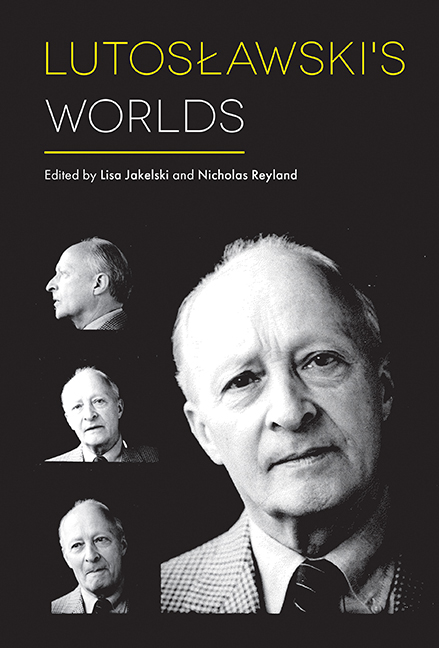Book contents
- Frontmatter
- Dedication
- Contents
- List of Figures
- List of Tables
- List of Music Examples
- List of Contributors
- Acknowledgements
- Introduction
- PART I mourning, modernism, and genius
- PART II other lutoslawskis
- 4 Behind the Curtain of Oblivion: Lutoslawski's Music for Theatre and Radio Plays
- 5 Derwid as Lutoslawski's Patron
- 6 Witold Lutoslawski in Occupied Warsaw
- 7 Lutoslawski and Sonoristics
- PART III documents
- PART IV political engagement
- PART V legacies
- Bibliography
- Index
6 - Witold Lutoslawski in Occupied Warsaw
from PART II - other lutoslawskis
Published online by Cambridge University Press: 14 June 2019
- Frontmatter
- Dedication
- Contents
- List of Figures
- List of Tables
- List of Music Examples
- List of Contributors
- Acknowledgements
- Introduction
- PART I mourning, modernism, and genius
- PART II other lutoslawskis
- 4 Behind the Curtain of Oblivion: Lutoslawski's Music for Theatre and Radio Plays
- 5 Derwid as Lutoslawski's Patron
- 6 Witold Lutoslawski in Occupied Warsaw
- 7 Lutoslawski and Sonoristics
- PART III documents
- PART IV political engagement
- PART V legacies
- Bibliography
- Index
Summary
The German-Soviet occupation of Poland touched Witold Lutosławski and his family in a considerable way. Lutosławski was twenty-six years old when the war began; instead of pursuing his musical studies in Paris as planned, he was enlisted into the Polish army and worked as a radio operator with the ‘Kraków’ Army Headquarters. Taken prisoner by the Wehrmacht on 20 September 1939, he managed to escape and returned to Warsaw near the end of October. There he joined his mother, Maria Lutosławska, and his elder brother Jerzy. His second brother, Henryk, had been arrested by the Soviets while attempting to cross the border; deported to work camps in the Soviet Union, Henryk died of exhaustion and typhoid fever in Kolyma in October 1940. He thus became the third member of the Lutosławski family to fall victim to the Soviet system in the span of just over twenty years: Witold's father and uncle had been executed near Moscow on 5 September 1918 on ‘contra-revolutionary’ charges.
These facts of Lutosławski's biography and family history are now well known. Many of these details, however, had to be kept secret immediately after the war ended and Poland came under Soviet control. Whereas Poland's postwar communist regime generally accepted acts of mourning in remembrance of the losses inflicted by Nazi Germany, it was dangerous – if not impossible – to speak openly of the victims of the Soviet Union, which denied that it had persecuted Polish civilians and executed Polish officers in Katyń. Furthermore, the Polish security forces (Służba Bezpieczeństwa, SB) persecuted those who had been involved with the Home Army (Armia Krajowa, AK) or other clandestine organisations. Wartime survivors therefore typically minimised or hid their involvement with these organisations. In a private letter to her brother on 20 October 1975, Eugenia Umińska, a friend of Lutosławski and an outstanding violinist, expressed her regret that this silence had been necessary: ’It is a pity that 30 or 25 years ago we had neither the possibility nor the time to preserve some memories – facts, names. But, one still lived then in partial conspiracy, which was accompanied by the fear of endangering someone by writing his name down next to someone else's, etc.
- Type
- Chapter
- Information
- Lutoslawski's Worlds , pp. 141 - 164Publisher: Boydell & BrewerPrint publication year: 2018
- 1
- Cited by



